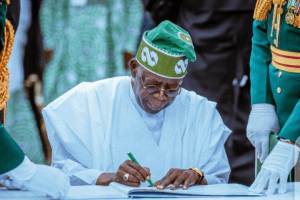Tinubu’s Early 2027 Campaigns: A Violation of the Law or a Strategic Move?
Parrot Newspaper
As Nigeria inches closer to the 2027 general elections, the political atmosphere is already heating up with indications that President Bola Ahmed Tinubu’s re-election campaign is in motion. Despite the legal framework prohibiting premature electioneering, some All Progressives Congress (APC) leaders have openly endorsed Tinubu for a second term, sparking debates over the legality, ethics, and implications of such actions on Nigeria’s democracy.
This article explores the legal, political, and social dimensions of early election campaigns, weighing the advantages for the ruling party against the potential risks to democratic governance.
The Legal Framework on Early Campaigns
The Nigerian electoral system, governed by the Electoral Act 2022 and the 1999 Constitution (as amended), sets clear guidelines for electioneering activities.
Key Legal Provisions
Tinubu’s Early 2027 Campaigns: A Violation of the Law or a Strategic Move?
Section 94(1) of the Electoral Act 2022 stipulates that political campaigns can only begin 150 days before election day and must end 24 hours before polling begins.
Section 95(1) mandates that campaigns must follow rules and regulations set by the Independent National Electoral Commission (INEC).
Section 95(2) prohibits political parties from using public funds or government resources to finance campaigns.
From a legal standpoint, open endorsements, campaign rallies, and billboard displays advocating for Tinubu’s second term nearly three years before the elections appear to contravene these provisions. The question then arises: why has there been no enforcement action from INEC or other regulatory bodies?
The Political Strategy Behind Early Campaigns
While early campaigning might seem premature, there are clear strategic advantages:
1. Controlling the Narrative
By launching re-election discussions early, the APC is positioning Tinubu as the dominant candidate, shaping public perception, and overshadowing opposition parties.
2. Weakening Opponents Before They Mobilize
An early start forces opposition parties—especially the People’s Democratic Party (PDP) and Labour Party (LP)—to respond before they are fully prepared, diverting their attention from governance critiques to counter-campaigning.
3. Securing Party Loyalty
Early endorsements from state governors, ministers, and party leaders ensure that APC stakeholders rally behind Tinubu, preventing internal divisions that could lead to a fragmented primary process.
4. Economic Incentives and Voter Influence
Through high-profile rallies and donation events—such as the ₦450 million food distribution in Kebbi State—the ruling party is subtly leveraging campaign tactics under the guise of governance. This raises concerns about whether public funds are being used for political gains.
Democratic and Ethical Concerns
1. Undermining the Rule of Law
If political parties disregard the electoral timeline without consequences, it sets a precedent for lawlessness. Opposition voices, including PDP National Executive Committee member Timothy Osadolor, argue that such actions threaten electoral integrity.
2. Distraction from Governance
With economic hardships, security challenges, and policy debates still unresolved, critics argue that the APC should focus on delivering campaign promises instead of preparing for another election cycle.
3. Potential for Electoral Manipulation
Paul Ibe, spokesperson for former Vice President Atiku Abubakar, warns that early campaigns could be an indicator of a pre-determined election outcome, discouraging voter participation and fueling public distrust in the system.
INEC’s Role: Will There Be Consequences?
The Independent National Electoral Commission (INEC) has the constitutional authority to:
Sanction political parties that violate electoral laws.
Order the removal of campaign billboards and materials displayed before the official campaign period.
Disqualify candidates who persist in illegal campaign activities.

However, Nigeria’s history suggests that legal enforcement against the ruling party remains weak, raising doubts about INEC’s ability to act impartially.
International Comparisons: How Other Democracies Handle Premature Campaigns
Countries with strong electoral frameworks enforce strict guidelines on campaign timelines:
United States: While there are no federal restrictions on early campaigning, candidates must follow stringent campaign finance regulations to ensure fair competition.
United Kingdom: The Electoral Commission regulates political advertising, and any violations can result in heavy fines or campaign suspensions.
South Africa: The Electoral Commission of South Africa (IEC) monitors campaign timelines closely, disqualifying parties that breach regulations.
Nigeria can learn from these models by empowering INEC with greater autonomy and legal enforcement mechanisms to deter premature campaigns.
Conclusion: A Test for Nigeria’s Democracy
President Tinubu’s early re-election campaign—whether a strategic political move or a blatant disregard for the law—sets a critical test for Nigeria’s electoral process. If left unchecked, it could normalize electoral impunity, undermining the credibility of future elections.
As the political landscape intensifies, Nigerians must demand accountability from INEC, political parties, and the judiciary to ensure that electoral laws are upheld. The 2027 elections should be a contest of ideas and governance records, not a pre-determined outcome shaped by premature campaigns.
Call to Action
For voters: Stay informed and demand transparency in election processes.
For INEC: Enforce campaign laws fairly, regardless of political affiliations.
For opposition parties: Focus on governance and policy alternatives rather than reactionary politics.
Nigeria’s democracy will only thrive if electoral integrity is prioritized over political ambition. The question remains—will INEC act, or will early campaigns become the new norm?


